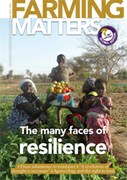Why is poverty deepening in Africa even when millions of dollars continue to be poured in to alleviate it?, asks Million Belay. He answers by highlighting how we need to promote agroecology, treat agriculture as a system, and move away from green revolution approaches.
Insanity, Albert Einstein once said, is doing the same thing again and again and expecting different results. It looks like that is what is being done in the name of poverty reduction for Africa.
There is little reflection on why poverty is deepening and ecosystems are degrading while millions of dollars continue to be poured into ‘alleviating’ poverty. Why are farmers still caught in this vicious cycle of remaining in poverty when so much money is being invested? One of the answers is the lack of understanding of agriculture as a system, and the focus on selected parts of the system such as seed or soil.
The common belief is that it is best to optimise the efficiency of a single unit of the system while disregarding the connectivity of all the parts. We plant improved varieties, add fertilizers and pesticides, and develop processes for storage and marketing. This linear model of development has succeeded in increasing production, but the problem is that the world does not work in a linear way. Life is full of surprises. Two years of drought and extreme flooding can reverse all the gains from such an approach. Publication after publication have documented the failures in conventional agricultural systems and shown their lack of resilience. Large tracts of barren and degraded lands, polluted rivers and soils, poisoned people and animals in developed countries are all evidence of this.
The Green Revolution in Africa is based on this unsustainable system. Under the guise of lifting 50 million Africans out of poverty, governments and big businesses are joining hands to ‘sell’ this approach. The G8 New Alliance for Food Security and Nutrition, led by governments from the North and joined by an array of companies, is succeeding in arm-twisting African governments into implementing unfavourable obligations. Changes are also being made to the continent’s own Comprehensive African Agriculture Development Program (CAADP) through various means to suit their purpose. These are forcing African countries to harmonise seed laws with little understanding of African governance and no knowledge of farmers. These threaten the rights of farmers, destroy our biological and cultural diversity, and will help to put African heritage in the hands of multinational corporations.
We need to look at agriculture as a system, promote agroecology, and stop this impending disaster before it is too late. We need to mobilise African people and governments to reject this model and to develop home-grown solutions based on the knowledge, experience and innovation of our own farmers.
Million Belay
Million Belay is the director of the Movement for Ecological Learning and Community Action (MELCA), Ethiopia, and the coordinator of the Africa Food Sovereignty Alliance. Dr Belay is our regular columnist throughout 2014.
Email: millionbelay@gmail.com

